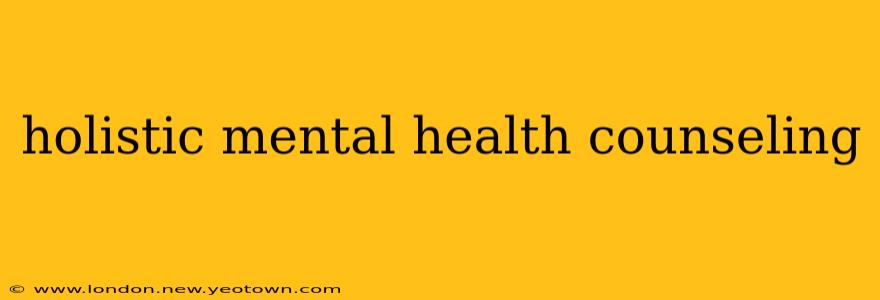The modern world often treats the mind as separate from the body and spirit. But true well-being requires a holistic approach, recognizing the interconnectedness of our physical, emotional, and spiritual selves. Holistic mental health counseling takes this interconnectedness seriously, offering a path to healing that goes beyond simply addressing symptoms. It’s about understanding the root causes of your struggles and nurturing your entire being to achieve lasting well-being. Imagine it as a journey, not just a quick fix.
What is Holistic Mental Health Counseling?
Holistic mental health counseling views mental health through a wide lens. It moves beyond the traditional talk therapy model, incorporating various techniques and perspectives to create a personalized plan for each individual. This might include elements of traditional psychotherapy, but it also integrates practices like mindfulness, meditation, yoga, art therapy, nutrition counseling, and even nature-based therapies. The aim is to address the whole person – mind, body, and spirit – to promote balance and well-being.
What are the Benefits of Holistic Mental Health Counseling?
The benefits extend far beyond simply alleviating symptoms. Think of it as building a strong foundation for your life. It helps you:
- Understand the root cause of your struggles: It's not just about managing anxiety; it's about uncovering the underlying beliefs and experiences contributing to it.
- Develop coping mechanisms: Instead of relying solely on medication, you learn practical tools to navigate stress and challenges.
- Improve self-awareness: Through introspection and various therapeutic practices, you gain a deeper understanding of yourself.
- Increase self-compassion: You learn to treat yourself with kindness and understanding, fostering self-acceptance.
- Enhance overall well-being: The holistic approach focuses on overall health, impacting physical and spiritual well-being, not just mental health.
How Does Holistic Mental Health Counseling Differ from Traditional Therapy?
Traditional therapy often focuses on specific mental health conditions, using talk therapy techniques to address symptoms. While effective for many, it may not always address the underlying physical, emotional, or spiritual factors contributing to those conditions. Holistic counseling, on the other hand, takes a broader view, integrating various approaches to foster comprehensive healing. It's like comparing treating a fever with medication alone versus addressing the underlying infection causing it.
What Techniques are Used in Holistic Mental Health Counseling?
A wide range of techniques are used, tailored to the individual’s needs and preferences. Some common examples include:
- Mindfulness and Meditation: Cultivating present moment awareness to reduce stress and improve emotional regulation.
- Yoga and Movement: Physical activity releases endorphins and can have a profound impact on mental well-being.
- Art Therapy: Expressing emotions and experiences through creative outlets like painting, drawing, or sculpting.
- Nutritional Counseling: Exploring the connection between diet and mental health.
- Nature-Based Therapy: Spending time in nature to reduce stress and promote relaxation.
Is Holistic Mental Health Counseling Right for Me?
If you're seeking a more comprehensive approach to mental health, one that considers your entire being, holistic counseling might be a good fit. It's particularly helpful for individuals who:
- Feel traditional therapy hasn't fully addressed their needs.
- Want to explore the connection between mind, body, and spirit.
- Are open to trying different therapeutic approaches.
- Seek lasting and sustainable change.
How Can I Find a Holistic Mental Health Counselor?
Finding the right counselor is crucial. Look for practitioners who are certified or experienced in holistic methods and whose approach resonates with you. You can start by searching online directories or asking for recommendations from your healthcare provider. Remember to schedule a consultation to ensure it's a good fit.
What Questions Should I Ask a Potential Holistic Mental Health Counselor?
Asking the right questions is vital before committing. Here are some questions to consider:
- What specific holistic methods do you utilize?
- What is your approach to integrating mind, body, and spirit?
- What is your experience with my specific concerns?
- What are your fees and insurance coverage?
- Can you provide references or testimonials?
Embarking on a holistic mental health journey is a personal and empowering experience. It’s about recognizing your inherent strength and capacity for healing, nurtured and guided by a compassionate and skilled professional. It’s a journey toward wholeness, one step at a time.

